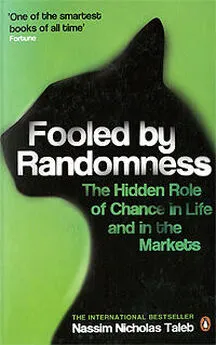Нассим Талеб - Чёрный лебедь. Под знаком непредсказуемости
- Название:Чёрный лебедь. Под знаком непредсказуемости
- Автор:
- Жанр:
- Издательство:КоЛибри
- Год:2009
- Город:Москва
- ISBN:978-5-389-00573-0
- Рейтинг:
- Избранное:Добавить в избранное
-
Отзывы:
-
Ваша оценка:
Нассим Талеб - Чёрный лебедь. Под знаком непредсказуемости краткое содержание
За одно только последнее десятилетие человечество пережило ряд тяжелейших потрясений: 11 сентября 2001 года, война в Осетии, мировой финансовый кризис. Все эти события, представляющиеся нам сейчас закономерными, казались абсолютно невозможными, пока они не произошли. Сорокадевятилетний ливанец, выпускник Сорбонны и нью-йоркский финансовый гуру Нассим Талеб называет такие непредсказуемые происшествия Черными лебедями. Он убежден: именно они дают толчок как истории в целом, так и существованию каждого отдельного человека. И чтобы преуспеть, надо знать, как с ними обращаться. Сразу после выхода этой книги автор блестяще продемонстрировал свою «не-теорию» на практике: на фоне финансового кризиса компания Талеба заработала (а не потеряла!) для инвесторов полмиллиарда долларов.
Из главного еретика Уолл-стрит, который в одиночку выступил против легиона футурологов и аналитиков, Нассим Талеб превратился в фигуру, чье влияние распространяется далеко за пределы финансового мира.
Чёрный лебедь. Под знаком непредсказуемости - читать онлайн бесплатно ознакомительный отрывок
Интервал:
Закладка:
Popkin, Richard H., 1951, «David Hume: His Pyrrhonism and His Critique of Pyrrhonism.» The Philosophical Quarterly 1(5): 385–407.
-, 1955, «The Skeptical Precursors of David Hume.» Philosophy and Phenomenological Research 16(1): 61–71.
-, 2003, The History of Scepticism: From Savonarola to Bayle. Oxford: Oxford University Press.
Popper, Karl R., 1971, The Open Society and Its Enemies, 5th ed. Princeton, N.J.: Princeton University Press.
-, 1992, Conjectures and Refutations: The Growth of Scientific Knowledge, 5th ed. London: Routledge.
-, 1994, The Myth of the Framework. London: Routledge.
-, 2002a, The Logic of Scientific Discovery, 15th ed. London: Routledge.
-, 2002b, The Poverty ofHistoricism. London: Routledge.
Posner, Richard A., 2004, Catastrophe: Risk and Response. Oxford: Oxford University Press.
Price, Derek J. de Solla, 1965, «Networks of Scientific Papers.» Science 149: 510–515.
-, 1970, «Citation Measures of Hard Science, Soft Science, Technology, and Non-science.» In С. E. Nelson and D. K. Pollak, eds., Communication Among Scientists and Engineers. Lexington, Mass.: Heat.
-, 1976, «A General Theory of Bibliometric and Other Cumulative Advantage Processes.» Jo urnal of the American Society of Information Sciences 27: 292–306.
Prigogine, Ilya, 1996, The End of Certainty: Time, Chaos, and the New Laws of Nature. New York: The Free Press.
Quammen, David, 2006, The Reluctant Mr. Darwin. New York: W. W. Norton and Company.
Quine, W. V., 1951, «Two Dogmas of Empiricism.» The Philosophical Review 60: 20–43.
-, 1970, «Natural Kinds.» In N. Rescher, ed., Essays in Honor of Carl G. Hempel. Dordrecht: D. Reidel.
Rabin, M., 1998, «Psychology and Economics.» Journal of Economic Literature 36:11–46.
Rabin, M., and R. H. Thaler, 2001, «Anomalies: Risk Aversion.» Journal of Economic Perspectives 15(1): 219–232.
Rabin, Matthew, 2000, «Inference by Believers in the Law of Small Numbers.» Working Paper, Economics Department, University of California, Berkeley, http://repositories.cdlib.org/iber/econ/.
Ramachandran, V. S., 2003, The Emerging Mind. London: Portfolio.
Ramachandran, V. S., and S. Blakeslee, 1998, Phantoms in the Brain. New York: Morrow.
RANCieRE, Jacques, 1997, Les mots de Vhistoire. Essai de poetique du savoir. Paris: Editions du Seuil.
Ratey, John J., 2001, A User's Guide to the Brain: Perception, Attention and the Four Theaters of the Brain. New York: Pantheon.
Rawls, John, 1971, A Theory of Justice. Cambridge, Mass.: Harvard University Press.
Reboul, Anne, 2006, «Similarities and Differences Between Human and Nonhuman Causal Cognition.» Interdisciplines Conference on Causality, www.interdisciplines.org.
Redner, S., 1998, «How Popular Is Your Paper? An Empirical Study of the Citation Distribution.» European Physical Journal В 4:131–134.
Rees, Martin, 2004, Our Final Century: Will Civilization Survive the Twenty-first Century? London: Arrow Books. Reichenbach, H., 1938, Experience and prediction. Chicago: The University of Chicago Press.
Remus, W., M. Oapos Connor, and K. Griggs, 1997, «Does Feedback Improve the Accuracy of Recurrent Judgmental Forecasts?» Proceedings of the Thirtieth Hawaii International Conference on System Sciences, January 7–10: 5–6.
Rescher, Nicholas, 1995, Luck: The Brilliant Randomness of Everyday Life. New York: Farrar, Straus & Giroux.
-, 2001, Paradoxes: Their Roots, Range, and Resolution. Chicago: Open Court Books.
Richardson, L. R, i960, Statistics of Deadly Quarrels. Pacific Grove, Calif.: Boxwood Press.
Rips, L., 2001, «Necessity and Natural Categories.» Psychological Bulletin 127: 827–852.
Roberts, Royston M., 1989, Serendipity: Accidental Discoveries in Science. New York: Wiley.
Robins, Richard W., 2005, «Psychology: The Nature of Personality: Genes, Culture, and National Character.» Science 310: 62–63.
Rollet, Laurent, 2005, Un mathematicien au Pantheon? Autour de la mort de Henri Poincare. Laboratoire de Philosophic et d'Histoire des Sciences — Archives Henri-Poincare, Universite Nancy 2.
Ronis, D. L., and J. F. Yates, 1987, «Components of Probability Judgment Accuracy: Individual Consistency and Effects of Subject Matter and Assessment Method.» Organizational Behavior and Human Decision Processes 40:193–218.
Rosch, E., 1978, «Principles of Categorization.» In E. Rosch and В. B. Lloyd, eds., Cognition and Categorization. Hillsdale, N.J.: Lawrence Erlbaum.
Rosch, E. H., 1973, «Natural Categories.» Cognitive Psychology 4: 328–350. Rose, Steven, 2003, The Making of Memory: From Molecules to Mind, revised ed. New York: Vintage.
Rosen, S., 1981, «The Economics of Superstars.» American Economic Review 71: 845–858.
Rosenzweig, Phil, 2006, The Halo Effect and Other Business Delusions: Why Experts Are So Often Wrong and What Wise Managers Must Know. New York: The Free Press.
Ross, Stephen A., 2004, Neoclassical Finance. Princeton, N.J.: Princeton University Press.
Rounding, Virginia, 2006, Catherine the Great: Love, Sex and Power. London: Hutchinson.
Ruelle, David, 1991, Hasard et chaos. Paris: Odile Jacob.
RuFFie, Jacques, 1977, De la biologie a la culture. Paris: Flammarion.
Russell, Bertrand, 1912, The Problems of Philosophy. New York: Oxford University Press.
-, 1993, My Philosophical Development. London: Routledge.
-, 1996, Sceptical Essays. London: Routledge.
Russo, J. Edward, and Paul J. H. Schoernaker, 1992, «Managing Over-confidence.» Sloan Management Review 33(2): 7–17.
Ryle, Gilbert, 1949, The Concept of Mind. Chicago: The University of Chicago Press.
Salganik, Matthew J., Peter S. Dodds, and Duncan J. Watts, 2006, «Experimental Study of Inequality and Unpredictability in an Artificial Cultural Market.» Science 311: 854–856.
Samuelson, Paul A., 1983, Foundations of Economic Analysis. Cambridge,Mass.: Harvard University Press.
Sapolsky, Robert M., 1998, Why Zebras Don't Get Ulcers: An Updated Guide to Stress, Stress-related Diseases, and Coping. New York: W. H. Freeman and Company.
Sapolsky, Robert, M., and the Department of Neurology and Neurological Sciences, Stanford University School of Medicine, 2003, «Glucocorticoids and Hippocampal Atrophy in Neuropsychiatric Disorders.»
Savage, Leonard J., 1972, The Foundations of Statistics. New York: Dover.
Schacter, Daniel L., 2001, The Seven Sins of Memory: How the Mind Forgets and Remembers. Boston: Houghton Mifflin.
Schelling, Thomas, 1971, «Dynamic Models of Segregation.» Journal of Mathematical Sociology 1:143–186.
-, 1978, Micromotives and Macrobehavior. New York: W. W. Norton and Company.
Scheps, Ruth, ed., 1996, Les sciences de la prevision. Paris: Editions du Seuil. Schroeder, Manfred, 1991, Fractals, Chaos, Power Laws: Minutes from an Infinite Paradise. New York: W. H. Freeman and Company.
Schumpeter, Joseph, 1942, Capitalism, Socialism and Democracy. New York: Harper.
Seglen, P. O., 1992, «The Skewness of Science.» Journal of the American Society for Information Science 43: 628–638.
Sextus Empiricus, 2000, Outline of Scepticism, edited by Julia Annas and Jonathan Barnes. New York: Cambridge University Press.
-, 2005, Against the Logicians, translated and edited by Richard Bett. New York: Cambridge University Press.
Shackle, G.L.S., 1961, Decision Order and Time in Human Affairs. Cambridge: Cambridge University Press.
-, 1973, Epistemics and Economics: A Critique of Economic Doctrines. Cambridge: Cambridge University Press.
Shanteau, J., 1992, «Competence in Experts: The Role of Task Characteristics.» Organizational Behavior and Human Decision Processes 53: 252–266.
Sharpe, William F., 1994, «The Sharpe Ratio.» Journal of Portfolio Management 21(1): 49–58.
-, 1996, «Mutual Fund Performance.» Journal of Business 39:119–138.
Shiller, Robert J., 1981, «Do Stock Prices Move Too Much to Be Justified by Subsequent Changes in Dividends?» American Economic Review 71(3): 421–436.
-, 1989, Market Volatility. Cambridge, Mass.: The MIT Press.
-, 1990, «Market Volatility and Investor Behavior.» American Economic Review 80(2): 58–62.
-, 1995, «Conversation, Information, and Herd Behavior.» American Economic Review 85(2): 181–185.
-, 2000, Irrational Exuberance. Princeton, N.J.: Princeton University Press.
-, 2003, The New Financial Order: Risk in the 21st Century. Princeton, N.J.: Princeton University Press.
Shizgal, Peter, 1999, «On the Neural Computation of Utility: Implications from Studies of Brain Simulation Rewards.» In D. Kahneman, E. Diener, and N. Schwarz, eds., 1999. Sieff, E. M., R. M. Dawes, and G. Loewenstein, 1999, «Anticipated Versus Actual Reaction to HIV Test Results.» American Journal of Psychology 122: 297–311.
Silverberg, Gerald, and Bart Verspagen, 2004, «The Size Distribution of Innovations Revisited: An Application of Extreme Value Statistics to Citation and Value Measures of Patent Significance,» http://edocs.ub.unimaas.nl/loader/file.asp?id=93i.
-, 2005, «Self-organization of R&D Search in Complex Technology Spaces», http://www.springerlink.com/content/j277q59458513067/fulltext.pdf.
Simon, Herbert A., 1955, «On a Class of Skew Distribution Functions.» Biometrika 42:425–440.
-, 1987, «Behavioral Economics.» In J. Eatwell, M. Milgate, and P. Newman, eds., 1987.
Simonton, Dean Keith, 1999, Origins of Genius: Darwinian Perspectives on Creativity. New York: Oxford University Press.
-, 2004, Creativity. New York: Cambridge University Press.
Sloman, S. A., 1993, «Feature Based Induction.» Cognitive Psychology 25:231–280.
-, 1994, «When Explanations Compete: The Role of Explanatory Coherence on Judgments of Likelihood.» Cognition 52:1–21.
-, 1996, «The Empirical Case for Two Systems of Reasoning.» Psychological Bulletin 119: 3–22.
-, 1998, «Categorical Inference Is Not a Tree: The Myth of Inheritance Hierarchies.» Cognitive Psychology 35:1–33.
-, 2002, «Two Systems of Reasoning.» In T. Gilovich, D. Griffin, and D. Kahneman, eds., 2002.
Sloman, S. А., В. C. Love, and W. Ahn, 1998, «Feature Centrality and Conceptual Coherence.» Cognitive Science 22:189–228.
Sloman, S. A., and В. C. Malt, 2003, «Artifacts Are Not Ascribed Essences, Nor Are They Treated as Belonging to Kinds.» Language and Cognitive Processes 18:563–582.
Sloman, S. A., and D. Over, 2003, «Probability Judgment from the Inside and Out.» In D. Over, ed., Evolution and the Psychology of Thinking: The Debate. New York: Psychology Press.
Sloman, S. A., and L. J. Rips, 1998, «Similarity as an Explanatory Construct.» Cognition 65: 87–101.
Slovic, Paul, M. Finucane, E. Peters, and D. G. MacGregor, 2003a, «Rational Actors or Rational Fools? Implications of the Affect Heuristic for Behavioral Economics.» Working Paper, www.decisionresearch.com.
-, 2003b, «Risk as Analysis, Risk as Feelings: Some Thoughts About Affect, Reason, Risk, and Rationality.» Paper presented at the Annual Meeting of the Society for Risk Analysis, New Orleans, La., December 10, 2002.
Slovic, P., M. Finucane, E. Peters, and D. G. MacGregor, 2002, «The Affect Heuristic.» In T. Gilovich, D. Griffin, and D. Kahneman, eds., 2002.
Slovic, P., B. Fischhoff, and S. Lichtenstein, 1976, «Cognitive Processes and Societal Risk Taking.» In John S. Carroll and John W. Payne, eds., Cognition and Social Behavior. Hillsdale, N.J.: Lawrence Erlbaum.
-, 1977, «Behavioral Decision Theory.» Annual Review of Psychology 28:1–39.
Slovic, Р., В. Fischhoff, S. Lichtenstein, B. Corrigan, and B. Combs, 1977, «Preference for Insuring Against Probable Small Losses: Implications for the Theory and Practice of Insurance.» Journal of Risk and Insurance 44: 237–258. Reprinted in P. Slovic, ed., The Perception of Risk. London: Earthscan.
Читать дальшеИнтервал:
Закладка:










